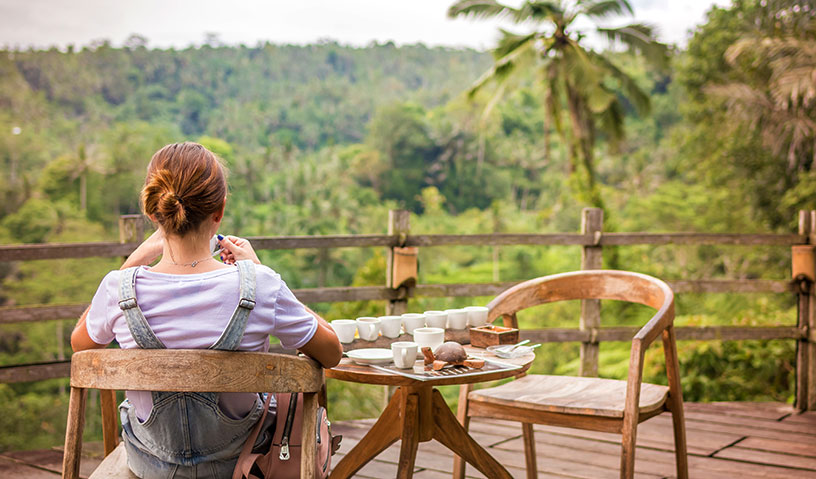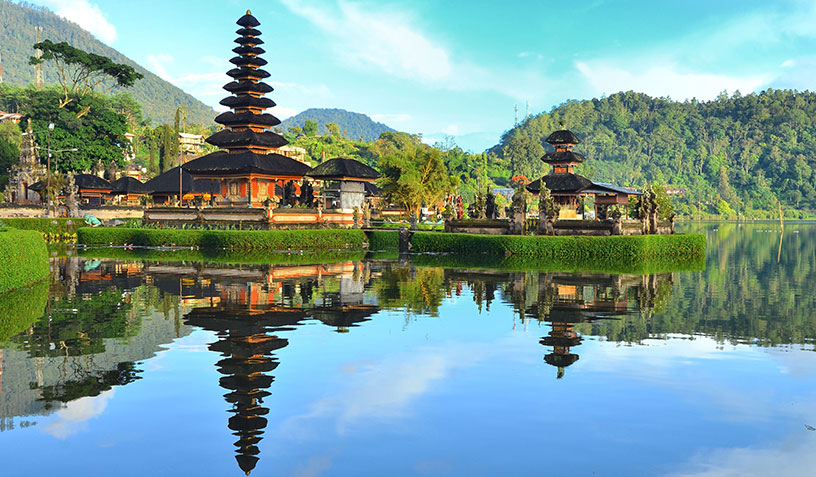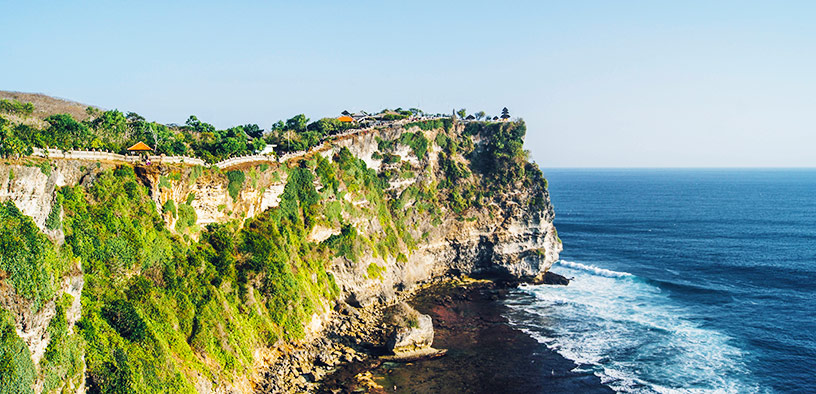Bali belly: What it is and how to avoid it
Rushing to the bathroom with an upset stomach or food poisoning is the last way you want to spend your holidays.
Traveller's diarrhoea can affect people travelling anywhere, but most frequently affects tourists visiting developing countries.
It is a relatively common travel sickness but the symptoms aren’t pleasant. Bali belly, Montezuma's revenge, the Rangoon runs and gastro all refer to the same thing - stomach cramps, diarrhoea, vomiting, aches, and pains.
These are the kinds of symptoms that can derail carefully planned holiday itineraries. It is nasty, painful and can leave you not wanting to venture too far from your hotel toilet.
It's important that you and your family stay healthy so you can enjoy your well-deserved holiday! Find out what you need to know about Bali belly below so your trip to Indonesia doesn't have you stuck on the toilet.
Skip ahead to read:
- Symptoms of Bali Belly
- What causes Bali Belly?
- How to avoid Bali Belly
- Foods you should avoid
- How to get rid of Bali Belly
- What can you eat with Bali Belly?
- Can you drink the water in Bali?
- Travel tips for Bali

In 2017, Cover-More customers had 1457 reported cases of gastro, costing almost $2 million in emergency expenses.
You can get traveller’s diarrhoea or a gastro bug anywhere, including when there’s outbreaks in Australia that spread through offices and schools.
It is more common for travellers to be exposed in countries like Indonesia, Thailand, Cambodia, Vietnam, Peru, and India. Africa is also a big culprit of giving travellers food poisoning and for having lower hygiene standards.
As one unlucky Cover-More customer found out, a case of gastro in the USA can leave you with bills of around $100,000. Long hospital stays, IV drips and multiple medical tests can add up.
If you are prone to serious infections, suffer from IBS, or are diabetic, you may be more susceptible.
Have a chat with your GP or travel doctor prior to departing on your holiday so you can prepare and hopefully reduce the risk of catching Bali belly.
Consider protecting your trip with our Bali travel insurance and travel with peace of mind.
Bali belly or traveller’s diarrhoea can often be picked up in the first week of travel. Your body is exposed to new and unfamiliar bacteria and viruses.
After contamination, it can take between two to five hours for symptoms to appear. Your first symptom might be a sudden onset of rumbling stomach, bloating or nausea.
Other symptoms can include:
- Loose or watery stools (diarrhoea)
- Urgency/frequency in going to the toilet
- Abdominal cramping, bloating and pain
- Mild temperature
- General malaise (weakness or discomfort)
- Loss of appetite
You can seek professional medical help if you are unwell while abroad. If you are still experiencing symptoms after a few days, consider booking an appointment to see a medical professional.
Blood or mucus in the diarrhoea, a high fever, and significant abdominal pain can indicate a more serious illness. You should consult a medical professional immediately.
Dehydration can be a serious consequence of traveller’s diarrhoea. If you think you are suffering from dehydration, see a doctor as soon as possible.
It is better to be safe than sorry and get your recovery on track!

Bali belly isn't the only thing you need to watch out for when visiting Indonesia. Find out how to avoid methanol poisoning.
Traveller’s diarrhoea or Bali belly can be caused by consuming contaminated food and water. Untreated water can carry pathogens such as bacteria, viruses or protozoans.
Poor sanitation practices and lower hygiene standards can also lead to these pathogens appearing in your food. The majority of cases are caused by bacteria, with E. Coli being one of the most common.
Eating off a wet plate, consuming food handled by someone who hasn’t washed their hands, or drinking tap water are all scenarios that could leave you sick.
While you might think to ‘do what the locals do’, there is a good chance they have developed immunity. A glass of untreated water might have no effect on them but the same glass might leave you retching.
Play it safe so you stay healthy and aren't stuck spending your holiday unable to leave the bathroom.
You'll want to do as much as possible to prevent getting Bali belly.
There are a number of things you can do to help avoid getting traveller’s diarrhoea, such as:
- Only drink bottled or filtered water. You should also brush your teeth with bottled water and avoid getting it in your mouth in the shower. Even if the locals drink the water, your digestive system is not used to the new bacteria.
- Ask for drinks without ice. Ice is often made with tap water.
- Make sure your tea, coffee, or juices are made with bottled or boiled water.
- Many street vendors will serve up food and drinks on freshly washed plates and cups. Make sure they’re completely dry before using them.
- Be cautious about where you get your fruit and vegetables from. Make sure to wash them with bottled or boiled water.
- Be vigilant about washing your hands and using a hand sanitiser.
- Peeled and pre-cut fruits might look tempting but they can also make you sick. Buy whole fruits and cut them up yourself.
- Avoid eating raw, rare or uncooked meat in developing countries.
- Don’t eat food at room temperature, food that has been sitting in the sun or food from buffets.
- Avoid unpasteurized dairy products, shaved ice or mobile soft-serve vendors.
- Eat at popular restaurants with a high turnover. This means the food will be fresh and not pre-cooked.

Planning on visiting monkey parks in Bali? Make sure you don't contract Rabies. Find out how to prevent exposure to the virus.
While Southeast Asia is one of the worst offenders for traveller’s diarrhoea and food poisoning, it also has some world-class street food.
Choosing whether to eat the street food or not is a personal choice. If you’re someone who gets sick easily, it might be best to avoid it.
Here are some tips for eating street food:
- Choose places that are popular. These places are more likely to be turning out fresh, hot food.
- Avoid food that has been sitting at room temperature. It’s best to eat from places that are cooking the food in front of you.
- Avoid places that are close to the road. You don’t want your meal seasoned by traffic pollution.
You should also be cautious when consuming raw foods such salads, uncooked vegetables or fruits that can't be peeled. This is because they are often washed using local water - which can become problematic for unsuspecting travellers!
Raw or under-cooked meat, fish, shellfish and eggs are also foods you want to be weary of so you can prevent your risk of Bali belly.
If you are reading this section, we hope you haven't been struck down with Bali Bally! But if you have, let us suggest some ways to help get rid of this dreaded situation.
Here are some general tips to help you get rid of Bali belly:
- Drink plenty of bottled water to help reduce your risk of dehydration.
- To replace lost salts and minerals from your body, drink oral rehydration drinks.
- Take antibiotics to help kill a bacterial infection if instructed to do so by your treating doctor.
- Limit consumption of dairy foods as this can worsen diarrhoea.
- Avoid alcohol and spicy foods.
- Seek medical advice from a doctor.
As always, you should consult a medical professional for specific advice about how to treat your diagnosis.
You can reach out to our Emergency Assistance team if you need help finding a nearby medical centre.

Do you know what malaria is and how to avoid it? Here's what you need to know when visiting Indonesia.
If you do happen to get Bali belly, it is recommended to stick to a bland diet. This can help ease the uncomfortable symptoms of traveller's diarrhoea.
Some easily digested foods include:
- Soups and stews
- Potatoes
- Rice
- Bananas
- Applesauce
Consider only eating when hungry for the first couple of days, until you start feeling healthy and back to your usual self!
When travelling to developing countries, it's always a good idea to stick to drinking water from sealed water bottles.
You can usually pick these up for a low cost at local convenience stores, grocery shops or even your hotel.
When travelling in Bali and Indonesia, it's best to avoid drinking tap water as this can often be contaminated.
To err on the side of caution, brush your teeth using bottled water and forgo ice cubes in your drink.
Travel tips for Bali, Indonesia
Cover-More's registered nurses share their tips for travelling to Bali.
Don’t let traveller’s diarrhoea or Bali belly deter you from your travels.
While it might be common, there are steps you can take to reduce the risk of getting food poisoning.
But if you do end up with Bali belly and you have Cover-More travel insurance, you can be protected from unexpected overseas medical expenses and you can submit a claim for consideration for pre-booked tours or activities you missed* because of your Bali belly.
Consider protecting your holiday to Bali with travel insurance, or any other destination you're wanting to travel to!
Get a FREE quote for Bali travel insurance today!
Sources:
*Our Cover-More travel insurance plans do not automatically include cancellation cover. You can add the level of cancellation cover that best suits you and your trip when purchasing your policy. Limits, exclusions, and conditions apply. Refer to the Combined PDS/FSG for full details.
Material on this website is provided for informational purposes only. It is general information and discussion about medicine, health and related subjects may not apply to you as an individual, and is not a substitute for your own doctor’s medical care or advice. The words and other content provided on this website, and in any linked materials, are not intended and should not be construed as medical advice. If the reader or any other person has a medical concern, they should consult with an appropriately licensed physician or other health care worker. Nothing contained on the website is intended to establish a physician-patient relationship, to replace the services of a trained physician or health care professional, or otherwise to be a substitute for professional medical advice, diagnosis, or treatment. The views and opinions expressed on this website have no relation to those of any academic, hospital, practice or other institution with which the authors are affiliated. They do not necessarily reflect the opinions of Cover-More Insurance Services Pty Ltd. Never disregard medical advice or delay seeking medical care because of something you have read on or accessed through this website. If you think you may have a medical emergency, call your doctor or emergency services immediately.